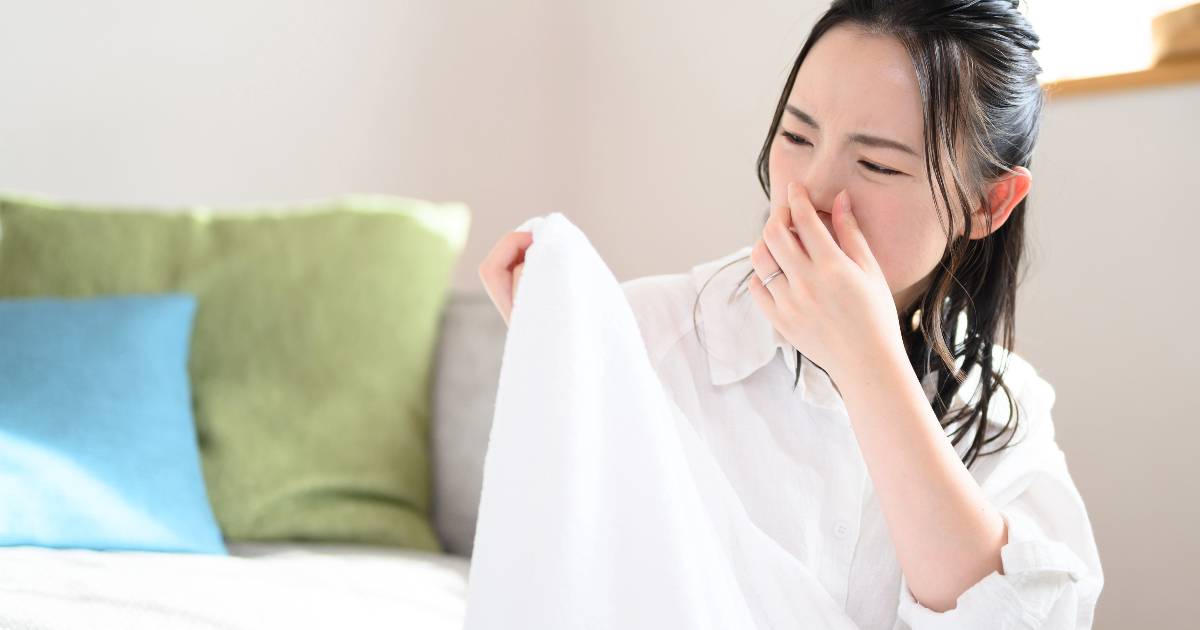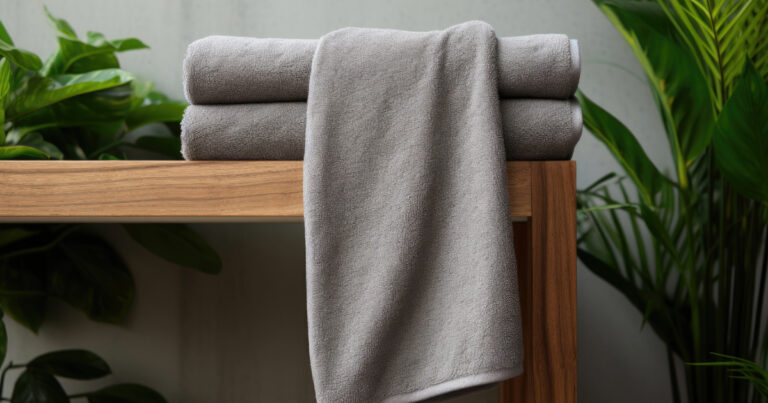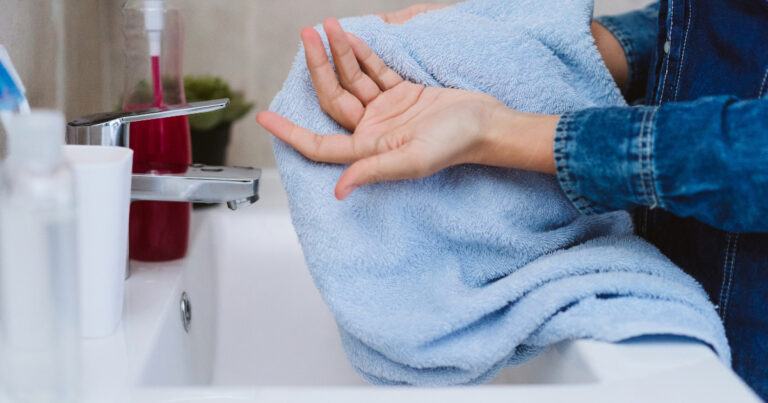Have you ever stepped out of a nice, relaxing shower only to be hit with an unpleasant mildew odor when you dry off with your bath towel? That sour, musty smell can really ruin the clean feeling you get from bathing.
Unfortunately, bath towels are prone to developing odors over time due to bacteria buildup. Understanding what causes your towels to smell can help you take steps to prevent it.

Bath towels provide the ideal environment for bacteria, mold, and mildew growth that causes odors. When you use a towel after bathing, you transfer dead skin cells, bacteria, and moisture into the towel’s fibers.
If the towel doesn’t fully dry before your next use, these organisms thrive in the damp, warm fibers and multiply, producing smelly by-products.
Leaving Wet Towels Balled Up
One of the main reasons towels smell is when you wad them up while they’re still wet. Folding or bunching up a damp towel traps moisture and prevents air circulation. This allows mold, mildew, and bacteria to rapidly multiply in the warm, humid environment inside the wadded towel.
Even towels that you don’t use to dry your body after bathing, like hand towels or kitchen towels, can develop mildew odors if left bunched up while damp. Properly drying towels is key to preventing smells.
High Humidity Environments
Bathrooms tend to be humid spaces, which promotes odor-causing bacteria growth. The humidity comes from hot showers, baths, steam from sinks, and inadequate ventilation. If your bathroom doesn’t have a window or exhaust fan, the moist air has nowhere to go. This humidity gets trapped in towels, allowing bacterial odors to develop.
Increasing bathroom ventilation can help towels dry more quickly between uses and prevent mildew smells. Run an exhaust fan during and after bathing to remove moisture.
Skipping Laundry Too Long
Not washing towels frequently enough also allows odors to build up. Most experts recommend washing bath towels after 3-4 uses. Towels used to dry hands and faces after washing should be laundered after each use.
The longer you wait between washing towels, the more dead skin cells, body oils, and bacteria accumulate. Letting stinky towels fester in the laundry hamper compounds the issue. Be sure to wash them as soon as possible to get rid of odors.
Improper Drying
Even if you wash towels frequently, they can still smelly if you don’t dry them thoroughly. Lingering moisture allows mold and bacteria to return. Always dry towels completely before storing or reusing them.
Using an undersized or overloaded dryer can prevent proper drying. Too many towels at once don’t get fully exposed to the hot air. Make sure to leave space for air circulation and don’t overload the dryer.
Fabric Softener Buildup
Fabric softeners and dryer sheets can cause towel odor issues. The oils and chemicals leave a coating on the fibers that traps odor-causing residues from detergents, body oils, and dead skin. This buildup prevents absorption and quick drying.
Avoid using fabric softeners and dryer sheets on towels. They provide little benefit and can exacerbate odor problems. If you must use them, do so sparingly.
Improper Laundering
Ineffective laundering techniques also contribute to lingering odors. Using too little detergent or washing in cold water prevents deep cleaning of towels. Bacteria and the smells they cause hang around in the fibers.
Always use the recommended amount of laundry detergent and wash towels in hot water. Cold water doesn’t sanitize as well. Doing an extra rinse cycle can also help remove detergent residue that bacteria feed on.
Dirty Washing Machine
If your washing machine itself is dirty, smells can transfer to clean towels. Gunk, mold, and bacteria can accumulate in a washing machine’s drum, gaskets, tub, and drainage areas if you don’t clean it regularly. Disinfect your washer periodically to prevent transferring odors to laundry.
Running empty hot cycles with either bleach or vinegar helps clean washing machines. Check the manual for your machine’s cleaning recommendations.
Retaining Moisture in Fibers
The materials towels are made from impact how well they dry. Materials like cotton that are very absorbent hold onto more water in their fibers. If retained moisture doesn’t fully evaporate, it creates conditions for bacterial odors.
Using towels made with fabrics designed to dry quickly, like microfiber, can help prevent smells. These fabrics retain less moisture. However, quick-dry fabrics may feel less soft and absorbent.
Infrequent Replacement
Older, worn out towels have a harder time staying fresh. Over time, towels become less absorbent and take longer to dry fully. The buildup of detergent residue, body oils, and dead skin cells also reduces drying capability. This creates an environment ripe for mildew odors.
Replace bath towels every year or two to keep them fresh and odor-free. Higher quality towels made of Turkish or Egyptian cotton last longer. But when towels appear thin, get stiffness, or smell persistently even after washing, it’s time to retire them.
Skipping Proper Hygiene
Your own body hygiene impacts towel odors too. Not thoroughly rinsing off dirt, sweat, and oils while bathing allows these odor-causing substances to transfer to towels.
Be diligent about washing all parts of your body with soap and rinsing fully. Pay extra attention to sweat-prone areas. Keeping your body clean minimizes the amount of bacteria that can grow in damp towels.
How to Prevent Smelly Towels
Now that you know the most common causes of towel odors, here are some tips to help keep your bath towels fresh between laundering. Taking a little extra care goes a long way towards preventing unpleasant smells.
Dry Thoroughly Between Uses
The number one way to avoid smelly towels is making sure they dry fully before using again. After each bath or shower, hang up towels on towel bars rather than hooks. Bars allow for more air circulation. Unfold towels instead of leaving them bunched up.
If possible, put towels outside for the fresh air and sun. The UV rays have a sanitizing effect to kill mold and mildew. Just make sure towels dry completely before bringing back inside.
Increase Bathroom Ventilation
Proper ventilation helps excess moisture dissipate so towels dry faster. Run exhaust fans during and after hot showers for 30 minutes or more. Open bathroom windows if possible too. Dehumidifiers also remove dampness from the air.
Making sure damp air doesn’t get trapped speeds up towel drying time. Ventilate even during colder months when you may be inclined to keep windows closed.
Wash After 3 Uses Max
Don’t wait until laundry day to wash towels. Wash them every 3 uses or less. Towels used to dry hands and faces should be washed after each use. The less buildup of dead skin cells and oils, the less smelly bacteria thrive.
If you don’t have enough towels for frequent washing, consider getting a few extra. Having ample towels makes it easier to stay on top of laundry.
Use Proper Laundry Detergent
Skip the bargain detergents. Invest in a high quality laundry detergent designed to thoroughly clean and sanitize like Tide Antibacterial or Persil ProClean PowerCaps. Follow the recommended dosage, not less.
Wash towels separately from regular laundry for a deeper clean. Wash in the hottest water recommended for the material using an extra rinse cycle.
Disinfect Your Washer
Clean your washing machine regularly to avoid transferring smells to clean towels. Once a month, do a hot wash cycle with either bleach or vinegar to fully disinfect the drum, door, gaskets, drainage system, and tub. Refer to your machine’s owner’s manual for specific cleaning recommendations.
Replace Old Towels
Shop for new high quality bath towels every year or two. Look for ones made of either Turkish or Egyptian cotton. These types are very absorbent and less prone to residual moisture. Avoid cheaper big box store towel brands.
Retire towels once they become stained, frayed, threadbare, or consistently smelly despite washing. Older towels lose their odor-fighting capabilities.
Use Odor Fighting Additives
Look for towels and laundry detergents with antimicrobial and odor fighting properties. Silver ions, activated carbon, and other additives inhibit bacterial growth and odor. Or add a few drops of tea tree, eucalyptus, or lemon essential oils to your wash cycle for extra odor fighting power.
Line Dry Outdoors
If possible, line dry towels in direct sunlight. The UV rays have natural sanitizing effects to kill bacteria. The fresh outdoor air helps remove musty odors too. Just check homeowner association rules on clotheslines before putting them up outdoors.
Alternative Drying Methods
If line drying isn’t an option, use the lowest heat setting on the dryer and remove towels immediately when finished drying. Adding wool dryer balls helps separate towels for better airflow.
You can also invest in a towel warmer. These completely dry towels on a heated rack safely and quickly after each use. Just avoid hanging towels on towel warmers when still moist.
FAQs
What is the fastest way to dry bath towels?
The quickest way to dry towels is in a dryer on the highest heat setting recommended for the material. Remove promptly when finished and hang immediately to allow residual moisture to evaporate. Adding wool dryer balls separates the towels for better airflow.
Should you wash towels before first use?
Yes, it’s a good idea to wash new towels before initial use. Manufacturing processes leave residual chemicals and dye on new towels that can cause odors. Washing removes excess dye and helps soften fibers.
Can towels be cleaned in the washing machine?
Towels can and should be machine washed. Follow care instructions for water temperature. Use an extra rinse cycle and the recommended amount of detergent. Add vinegar or baking soda periodically for deep cleaning.
How do you get a mildew smell out of towels?
To remove mildew odors from towels, do a hot wash with detergent and 1 cup of white vinegar. Then rewash with 1/2 cup baking soda and no detergent. Dry thoroughly right away. Repeat if needed.
Why do my towels smell after washing?
If towels smell after washing, bacteria likely lingered in the machine or towel fibers. Re-wash with vinegar and baking soda. Clean your washing machine with hot water and vinegar or bleach. And make sure to dry towels completely.
Can you put towels in the dryer wet?
It’s best not to put damp towels directly into the dryer. Allow towels to air dry somewhat before finishing drying in the dryer. Added moisture in the dryer slows drying time and can cause odors.
Should you wash and dry towels separately?
It’s best to wash and dry towels separately from regular laundry. They require higher heat, more detergent, and extra rinses for thorough cleaning. Washing alone prevents odors from spreading and allows proper drying.
What temperature kills bacteria in towels?
Washing towels in 140°F to 150°F water helps kill bacteria like E. coli and salmonella. Water at 160°F and above sanitizes even more thoroughly. Follow care instructions for your towel material and use the hottest recommended water temperature.
Conclusion
Towels provide the perfect breeding ground for odor-causing bacteria thanks to their moisture-retaining absorbent fibers. But you’re not stuck living with smelly towels.
Be diligent about fully drying towels between each use. Wash towels frequently using hot water, the proper amount of detergent, and an extra rinse cycle. Clean your washing machine regularly. And invest in new high-quality Turkish or Egyptian cotton towels yearly.








